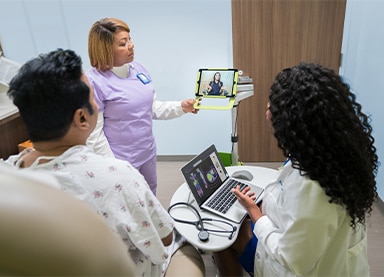Su neumólogo principal tiene años de capacitación adicional especializada en el tratamiento de enfermedades pulmonares. Se encargará de crear y actualizar su plan personal de atención de la fibrosis quística. Trabajará con usted, su familia y el resto de su equipo de atención para tratar las complicaciones y asegurarse de que esté al tanto de los nuevos medicamentos y tratamientos.

Vivir con fibrosis quística puede ser difícil, tanto a nivel físico como emocional. Por eso, nuestros equipos de atención brindan tratamiento, educación y apoyo a los pacientes y a sus familias. Y por eso usted, como paciente, recibe al menos una vez al año evaluaciones de todo el equipo de atención, que incluye a su médico, enfermero, profesional médico de cuidados respiratorios, nutricionista, fisioterapeuta y trabajador social. Al trabajar juntos, ayudamos a retrasar la evolución de la enfermedad, fomentamos un crecimiento y desarrollo normales en los niños, y les damos a usted y a su familia las herramientas necesarias para que lleven una vida plena e independiente.
Nuestro centro del Sur de California cuenta con el reconocimiento de la Cystic Fibrosis Foundation (Fundación sobre la Fibrosis Quística) como un centro de atención principal que fomenta la calidad de vida y la longevidad de los pacientes.
En este centro, usted tiene acceso conveniente a:
- clínicas especializadas para pacientes pediátricos y adultos con fibrosis quística;
- servicios de laboratorio y farmacia en el centro;
- medicamentos para la fibrosis quística (la mayoría disponibles para recoger el mismo día).

La adolescencia es difícil para todos, pero para Gabriel Abarca fue una etapa de desesperanza. Con 14 años y fibrosis quística, sufrió la pérdida de su hermana. Afortunadamente, el equipo de atención de Gabriel tenía nuevas esperanzas para su futuro. La estrecha relación que tenían le ayudó a cambiar su actitud. Hoy, con 25 años, trabaja, se inscribió en la universidad y está felizmente casado
La fibrosis quística es una enfermedad genética que hace que la mucosidad del cuerpo se vuelva espesa. La mucosidad puede obstruir las vías respiratorias y otros conductos importantes del sistema digestivo y de otros órganos. En la mayoría de los casos, es causada por la mutación (alteración) de un gen que se hereda de ambos padres.
Síntomas de la fibrosis quística
En los bebés, los síntomas comunes de la fibrosis quística son problemas respiratorios, piel salada, diarrea crónica y falta de crecimiento o aumento de peso incluso con un buen apetito.
Pruebas para detectar la fibrosis quística en bebés y niños
A la mayoría de los bebés se les hace una prueba de detección de la fibrosis quística al nacer con algunas gotas de sangre que se obtienen mediante un pinchazo en el talón. Si esta prueba da un resultado positivo, se revisará al bebé en nuestro Centro para la fibrosis quística (Cystic Fibrosis Center), donde los médicos solicitarán más pruebas. Esto incluye una prueba de sudor para detectar la fibrosis quística, que mide cuánto cloruro (o sal) hay en el sudor del bebé.
Pruebas de detección de la fibrosis quística en adultos
Es posible que quienes tengan formas más leves de la enfermedad o mutaciones más raras del gen de la fibrosis quística (CFTR) no presenten síntomas evidentes hasta la adolescencia o la edad adulta. Si tiene alguna duda, hable con su médico de atención primaria. Puede hacerle exámenes y, si corresponde, darle una referencia para otras pruebas.
Pruebas para detectar el gen de la fibrosis quística en adultos
Los adultos pueden hacerse pruebas para determinar si son portadores de una copia del gen CFTR mutado (alterado). La mayoría de los expertos recomiendan que cualquier persona embarazada o que tenga pensado buscar un embarazo se haga una prueba para detectar si es portadora de una copia del gen. Si obtiene un resultado positivo, su pareja también debe hacerse la prueba. Para que se produzca la fibrosis quística, el niño debe heredar 2 copias del gen mutado, una del padre y una de la madre. Sin embargo, aunque ambos padres obtengan un resultado positivo en la prueba del gen CFTR mutado, no significa que el niño vaya a tener fibrosis quística. Un asesor genético puede ayudarle a entender qué significan los resultados de su prueba genética.
Nuestro Centro para la fibrosis quística del Sur de California pertenece a una red nacional de centros principales acreditados que cuentan con el reconocimiento de la Cystic Fibrosis Foundation por su atención integral y por fomentar la calidad de vida y la longevidad (mayor tiempo de vida) de los pacientes.
Al contar con clínicas especializadas en fibrosis quística para niños y adultos y servicios de laboratorio y farmacia en el centro, puede obtener la atención que necesita en un mismo lugar.

El enfermero administrador de casos es el contacto principal a quien debe transmitirle sus preguntas e inquietudes. Coordinará sus cuidados médicos con todos los miembros de su equipo, le explicará su plan de atención de la fibrosis quística y le ayudará a obtener medicamentos y equipos. Si es necesario, puede ayudarle a comunicarse con otros profesionales de la salud y con sus familiares para hablar acerca de su afección. También puede ayudarle a acceder a recursos para controlar la enfermedad.
La terapia de limpieza de las vías respiratorias es fundamental para la salud respiratoria de las personas con fibrosis quística. Implica aflojar la mucosidad para extraerla. Su profesional médico de cuidados respiratorios les enseñará a usted y a su familia a usar dispositivos de limpieza de las vías respiratorias, aerosoles y otras técnicas de terapias en el hogar. Además, evaluará con regularidad el funcionamiento de los pulmones (verá si funcionan bien). Si es necesario, trabajará con su neumólogo para adaptar las terapias, de modo que sea más fácil para usted seguir el plan de tratamiento.
A la mayoría de los pacientes con fibrosis quística les cuesta digerir bien los alimentos, lo que genera una nutrición deficiente. En los niños, esto puede dificultar el crecimiento y el aumento de peso. A los adultos puede costarles mantener su peso ideal, lo cual es esencial para ayudar a combatir las infecciones. Su nutricionista hará un seguimiento del crecimiento, el peso y los suplementos de vitaminas para ayudarle a mejorar su consumo de alimentos y aporte nutricional. Si tiene insuficiencia pancreática (cuando el páncreas no produce suficientes enzimas para digerir completamente los alimentos), su nutricionista le ayudará a controlar la dosis de enzimas pancreáticas.
También le ayudará a tratar las complicaciones, como la diabetes y la osteoporosis relacionadas con la fibrosis quística.
Hacer ejercicio con regularidad le permite ganar fuerza, tener energía y mejorar su salud en general, y así llevar una vida plena y activa. El acondicionamiento físico también puede mejorar su capacidad para toser y expulsar la mucosidad de las vías respiratorias, lo cual es esencial para un mejor funcionamiento de los pulmones en las personas con fibrosis quística. Su fisioterapeuta trabajará con usted para diseñar un programa de acondicionamiento físico que le permita fortalecer o recuperar los músculos, y mejorar la resistencia y la postura. También puede enseñarle técnicas para limpiar las vías respiratorias.
Todos los pacientes nuevos se reúnen con un trabajador social, que les ayuda con referencias a recursos, educación y asesoramiento. Su trabajador social está disponible para ayudarles a usted y a su familia a buscar un equilibrio entre las demandas de la fibrosis quística y la vida cotidiana.
Si es un paciente con fibrosis quística y necesita atención médica con urgencia, vaya al centro de atención de urgencia más cercano. Se considera que una persona necesita atención de urgencia cuando debe recibir atención médica sin demora, por lo general, en un plazo de 24 a 48 horas, pero no se trata de una condición médica de emergencia.
Si cree que tiene una condición médica de emergencia, llame al 911 o vaya a la sala de emergencias más cercana.*
Después de acudir a un centro de atención de urgencia o a una sala de emergencias, pídale al médico que se comunique con el neumólogo de turno de Kaiser Permanente Los Angeles Medical Center.
Nota a pie
*Si cree que tiene una condición médica de emergencia, llame al 911 o vaya al hospital más cercano. Consulte la definición completa del término “condición médica de emergencia” en su Evidencia de Cobertura (Evidence of Coverage) u otros documentos relacionados con la cobertura.
Encuentre atención